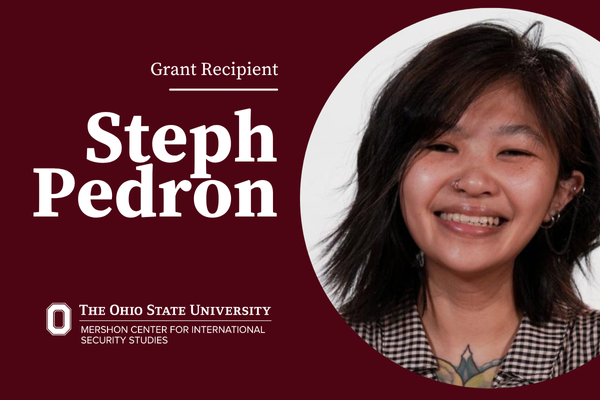Notes from the Field: Steph Pedron


Steph Pedron is a Mershon affiliate and a Political Science Ph.D. Candidate concentrating in American Politics, Political Methodology, and Political Psychology. Steph is working on a dissertation that examines how normalized out-group biases shape political attitudes and behavior by exploring three cases related to interminority antipathy, voter fraud, and redpilling.
This summer she worked on her Mershon supported research project Broadcasting Alt-Right Ideology: Epiphanic Attitude Shifts among People of Color, which explores how People of Color (PoC) come to believe in alt-right ideologies. She argues that this process is driven, in part, by a combination of message framing and level of commitment to racial or ethnic identity.
She focuses on two key outcomes—support for anti-diversity and monoculturalism—which serve as proxies for support for racially homogeneous communities, a core alt-right ideal that targets PoC and noncitizens. For Steph, exploring how political messaging shapes PoC attitudes feels both personally and socially important. The project resonates with her own experiences navigating questions of identity and belonging, answers questions about how other PoC think about diversity and community and helps explain the deeper forces that shape those views. It is also incredibly topical, as questions about diversity, nationalism, and who belongs in the U.S. are at the forefront of public debate.
“Alt right messaging was once confined to the fringes of political discourse but has gradually bled into everyday conversations,” said Steph. “Existing research in this area has focused on White Americans, but popular media like Fox News now broadcast these harmful ideas in ways that may make them more appealing to PoC by framing them as common-sense solutions to societal issues like economic instability and job insecurity. By making these ideas more accessible and appear more reasonable, they create a pathway through which individuals may gradually adopt more extreme views, which poses serious risks to social cohesion and can undermine efforts toward inclusivity and equality.”
Through an online survey experiment, Steph examined how PoC’s attitudes toward anti-diversity and monoculturalism are influenced by the framing of alt-right messages promoting homogeneous communities and by their level of commitment to their racial or ethnic identity. The main findings suggest that the soft-selling treatment is most effective at increasing support for anti-diversity and monoculturalism, consistent with liberal norms favoring subtle racial appeals. See Fig. 1. However, when considering racial identity commitment, she finds that certain PoC are more receptive to explicit messaging and potentially controversial racial narratives.

Specifically, her findings show that PoC with high commitment to their racial identity are more influenced by soft-sell messaging which subtly reinforces racial group boundaries, while those with low commitment to their racial identity are more susceptible to hard-sell messaging which uses more confrontational language such as biological arguments and vague appeals to nationalism. This suggests that PoC who are less anchored in racial in-group narratives may be more open to nationalistic appeals that offer a clear identity based on national conformity, despite the fact that such appeals often disregard their racial or ethnic backgrounds and ultimately put their own racial group at a disadvantage. Lastly, an open-ended question in the survey revealed that PoC possess a range of views about the ideal racial composition of their communities, which challenges the assumption that PoC uniformly support increased diversity in their neighborhoods.
By understanding how extreme ideas are normalized through framing and how they may affect subsets of the population differently, policymakers can create targeted, more effective counter-narratives or support more nuanced media policies regulating extremist views to better protect diverse groups. In an international context, the rise of alt-right movements often correlates with increased conflict and polarization, which poses a threat to societal stability. This research can shed light on some of the factors that facilitate ideological resistance or acceptance.
